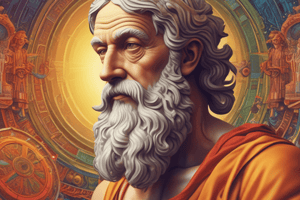Podcast
Questions and Answers
What is the Euthyphro Dilemma?
What is the Euthyphro Dilemma?
The Euthyphro Dilemma explores whether something is good because the gods prefer it or if the gods prefer it because it is inherently good.
Who introduced the Euthyphro Dilemma?
Who introduced the Euthyphro Dilemma?
Plato
What challenge does the Euthyphro Dilemma present to theists?
What challenge does the Euthyphro Dilemma present to theists?
Either accept that morality exists independently of divine beings or accept that divine preferences are arbitrary.
What is the Allegory of the Cave about?
What is the Allegory of the Cave about?
Who holds the view presented in the Allegory of the Cave?
Who holds the view presented in the Allegory of the Cave?
What does true knowledge come from according to Plato's Allegory of the Cave?
What does true knowledge come from according to Plato's Allegory of the Cave?
What central philosophical debate occurs in 'Protagoras'?
What central philosophical debate occurs in 'Protagoras'?
Who argues that virtue can be taught in Plato's 'Protagoras'?
Who argues that virtue can be taught in Plato's 'Protagoras'?
In 'City of God', what two cities does Augustine present?
In 'City of God', what two cities does Augustine present?
Who wrote 'City of God'?
Who wrote 'City of God'?
What ultimate goal of human life does Aristotle discuss in 'Nicomachean Ethics'?
What ultimate goal of human life does Aristotle discuss in 'Nicomachean Ethics'?
According to Aristotle, what is virtue?
According to Aristotle, what is virtue?
Flashcards are hidden until you start studying
Study Notes
Euthyphro Dilemma
- Explores the relationship between morality and divine preferences.
- Questions whether something is good because gods prefer it or if gods prefer it because it is inherently good.
- Raises issues about the nature of morality and divine authority.
- Traditionally attributed to Plato, introduced in the dialogue Euthyphro.
- Discussed by various philosophers, including Leibniz, who critiques divine command theory for potential arbitrariness.
- Presents a challenge for theists regarding the independence of morality from divine beings.
Allegory of the Cave
- Metaphor illustrating knowledge, reality, and human perception.
- Most people live in ignorance, perceiving only shadows of true reality.
- Highlights the journey from ignorance to enlightenment and the philosopher's responsibility to help others.
- Associated with Plato, presented in The Republic as part of his Theory of Forms.
- Emphasizes that true knowledge comes from understanding the Forms rather than sensory experience.
Protagoras
- Dialogues between Socrates and the sophist Protagoras on the nature of virtue and its teachability.
- Central debate: Is virtue a single entity or composed of various parts (e.g., wisdom, courage)?
- Protagoras argues that virtue can be taught, while Socrates is skeptical and probes deeper into the concept.
- The dialogue leaves the question of virtue's teachability open, highlighting its complexity.
City of God
- Augustine presents a vision of two cities: the City of God and the Earthly City.
- The City of God represents those living according to God's will; the Earthly City is for those pursuing worldly pleasures.
- Argues that history represents a struggle between these two cities, with the City of God prevailing in the afterlife.
- Augustine emphasizes faith's role, addressing human history and divine providence.
- Written in response to Rome's fall, countering the belief that Christianity caused its decline.
Nicomachean Ethics
- Aristotle analyzes virtue and the good life, proposing that the ultimate goal is eudaimonia (happiness or flourishing).
- Eudaimonia achieved by living in accordance with virtue, defined as the mean between extremes (Golden Mean).
- Virtue involves both intellectual knowledge and the development of good habits through practice and experience.
Studying That Suits You
Use AI to generate personalized quizzes and flashcards to suit your learning preferences.




